Related Research Articles

Puducherry, also known as Pondicherry, is a union territory of India. It was formed out of four territories of former French India, namely Pondichéry, Karikal (Karaikal), Mahé and Yanaon (Yanam), excluding Chandannagar. It is named after the largest district, Puducherry. Historically known as Pondicherry, the territory changed its official name to Puducherry on 20 September 2006.

Auroville is an experimental township in Viluppuram district, mostly in the state of Tamil Nadu, India, with some parts in the Union Territory of Pondicherry in India. It was founded in 1968 by Mirra Alfassa and designed by architect Roger Anger. As stated in Alfassa's first public message in 1965 stated:
Auroville wants to be a universal town where men and women of all countries are able to live in peace and progressive harmony, above all creeds, all politics and all nationalities. The purpose of Auroville is to realize human unity.
Kaikhosru Danjibuoy Sethna was an Indian poet, scholar, writer, philosopher, and cultural critic. He published more than 50 books. He was also known as Amal Kiran.
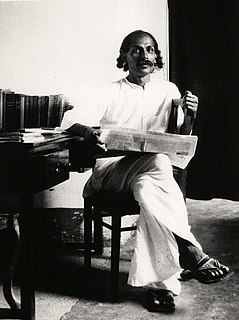
Nolini Kanta Gupta was a revolutionary, linguist, scholar, critic, poet, philosopher and yogi, and the most senior of Sri Aurobindo's disciples. He was born in Faridpur, East Bengal, to a cultured and prosperous Vaidya-Brahmin family. While in his teens, he came under the influence of Sri Aurobindo, then a well known revolutionary fighting for independence against the British. When in his fourth year at Presidency College, Calcutta, he left a promising academic career and rejected a lucrative government job to join a small revolutionary group under Sri Aurobindo. In May 1908 he was among those arrested for conspiracy in the Alipore bomb case. Acquitted a year later, after having spent a year in jail, he worked as a sub-editor for the Dharma and the Karmayogin, two of Sri Aurobindo's Nationalist newspapers, in 1909 and 1910.
M. P. Pandit was a spiritual author, teacher and Sanskrit scholar. For several decades, he was a secretary of the Mother of the Sri Aurobindo Ashram. He wrote numerous books and articles on the yoga of Sri Aurobindo and the Mother, on social and political thought, science, philosophy, religion, mysticism, and the classical texts and spiritual traditions of India.

The Sri Aurobindo Ashram is a spiritual community (ashram) located in Pondicherry, in the Indian territory of Puducherry. The ashram grew out of a small community of disciples who had gathered around Sri Aurobindo after he retired from politics and settled in Pondicherry in 1910. On 24 November 1926, after a major spiritual realization, Sri Aurobindo withdrew from public view in order to continue his spiritual work. At this time he handed over the full responsibility for the inner and outer lives of the sadhaks and the ashram to his spiritual collaborator, "The Mother", earlier known as Mirra Alfassa. This date is therefore generally known as the founding-day of the ashram, though, as Sri Aurobindo himself wrote, it had "less been created than grown around him as its centre."

Pondicherry, now known as Puducherry, is the capital and the most-populous city of the Union Territory of Puducherry in India. The city is in the Puducherry district on the southeast coast of India and is surrounded by the state of Tamil Nadu, with which it shares most of its culture, heritage and language.
Indra Sen was a devotee of Sri Aurobindo and The Mother, psychologist, author, and educator, and the founder of Integral psychology as an academic discipline.
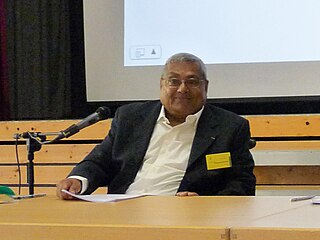
Prithwindra Mukherjee, retired in 2003 from a career as a researcher in the Human and Social Sciences Department (Ethnomusicology) of the French National Centre of Scientific Research in Paris, is an author of a number of books and other publications on various subjects.
Arya: A Philosophical Review was a 64-page monthly periodical written by Sri Aurobindo and published in India between 1914 and 1921. The majority of the material which initially appeared in the Arya was later edited and published in book-form as The Life Divine, The Synthesis of Yoga, The Secret of the Veda, The Foundations of Indian Culture and The Ideal of Human Unity as well as a number of translations of Vedic literature.
Sisir Kumar Maitra was Head of the Department of Philosophy and Dean of the Faculty of Arts, Banaras Hindu University. His writings compared Eastern and Western philosophy, and the teachings of Sri Aurobindo in comparison with Western philosophers.
The Advent is a quarterly magazine produced by the Sri Aurobindo Ashram, and is "Dedicated to the Exposition of Sri Aurobindo's Vision of the Future".
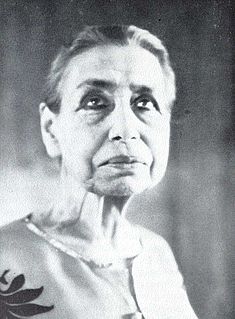
Mirra Alfassa, known to her followers as The Mother, was a spiritual guru,and a collaborator of Sri Aurobindo, who considered her to be of equal yogic stature to him and called her by the name "The Mother". She founded the Sri Aurobindo Ashram and established Auroville as a universal town; she was an influence and inspiration to many writers and spiritual personalities on the subject of Integral Yoga.

Sri Aurobindo was an Indian philosopher, yoga guru, maharishi, poet, and Indian nationalist. He was also a journalist, editing newspapers such as Bande Mataram. He joined the Indian movement for independence from British colonial rule, until 1910 was one of its influential leaders and then became a spiritual reformer, introducing his visions on human progress and spiritual evolution.

Pondicherry is the capital city of The Union Territory of Puducherry and is one of the most popular tourist destinations in South India.
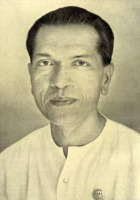
Tribhuvandas Purushottamdas Luhar, better known by his pen name Sundaram,, was a Gujarati poet and author from India.
The French community in India consists mainly of Indian citizens of French ancestry who are descended from former French settlers and colonists who settled in India since the 17th century, as well as recent expatriates from France.
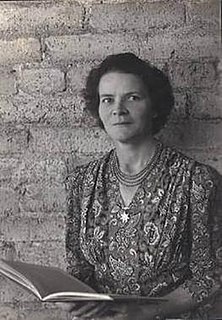
Judith Tyberg (1902–1980) was an American yogi ("Jyotipriya") and a renowned Sanskrit scholar and orientalist. Author of The Language of the Gods and two other reputed texts on Sanskrit, she was the founder and guiding spirit of the East-West Cultural Center in Los Angeles, California, a major pioneering door through which now-celebrated Indian yogis and spiritual teachers of many Eastern and mystical traditions were first introduced to America and the West.
Sampadananda Mishra is professor at Rashtram School of Public Leadership at Rishihood University. He is a Sanskrit scholar from Odisha. He worked at the Sri Aurobindo Foundation for Indian Culture from 1995 to 2021. Through the Vande Mataram Library Trust, an open-source and volunteer-driven project, he plans to generate verified, authentic English translations of almost all important scriptures available in Sanskrit.This pioneering project would also lay the foundation stone of original Sanskrit works that would enhance the appreciation and cultivation of the Vedic knowledge. Mishra was awarded the Maharshi Badrayan Vyas Award for Sanskrit in 2012 by Pratibha Patil, the then President of India. Mishra specializes in Sanskrit grammar.

T.V. Kapali Sastry was an eminent Sanskrit scholar, author, translator and disciple of Sri Aurobindo.
References
- ↑ The Governing Board > Kireet Joshi Archived 2011-06-10 at the Wayback Machine